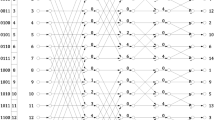Abstract
Fast Fourier Transform (FFT) and Inverse Fast Fourier Transform (IFFT) computations involve quite a large number of complex multiplications and complex additions. Optimizing the FFT processing elements in terms of complex multiplication reduces area and power consumption. In this paper, complex multipliers in the FFT processors are replaced by area and power efficient approximate multipliers. Approximate arithmetic computation appears to be effective solution for the systems that exhibit an intrinsic error tolerance. The computational errors arising because of approximation can be considered as trade-off for the significant gains in power and area. Approximate 8- and 16-bit multipliers are used in radix-2 butterfly unit which is the crucial computational component in FFT/IFFT processing. The designed FFT/IFFT processing units are analyzed, synthesized and simulated in Altera Cyclone II EP2C35F672C6 Field Programmable Gate Array (FPGA) device. Experimental results show that the proposed 16-point FFT architecture incorporating approximate complex multiplier achieves an area and power efficiency of 33.47% and 1.8% respectively compared to accurate 16-point FFT processor. The 8-point and 16-point Decimation In Time (DIT)—FFT incorporating approximate computational elements operate at a speed of 26.69 Gbps and 46.20 Gbps, respectively.


Similar content being viewed by others
References
Konguvel E, Kannan M (2018) A survey on FFT/IFFT processors for next generation telecommunication systems. J Circ Syst Comput 27(3):1830001
Manuel BR, Konguvel E, Kannan M (2017) An area efficient high speed optimized FFT algorithm. Signal Processing, Communication and Networking (ICSCN), 2017 Fourth International Conference on IEEE
Venkatachalam S, Ko S-B (2017) Design of power and area efficient approximate multipliers. IEEE Trans Very Large Scale Integr (VLSI) Syst 25(5):1782–1786
Lin C-H, Lin C (2013) High accuracy approximate multiplier with error correction. In: Proc. IEEE 31st Int. Conf. Comput. Design, pp 33–38
Bansal Y, Madhu C (2016) A novel high-speed approach for 16–16 vedic multiplication with compressor adders. Comput Elect Eng 49:39–49
Esposito D, Strollo AGM, Napoli E, De Caro D, Petra N (2018) Approximate multipliers based on new approximate compressors. IEEE Trans Circ Syst I. https://doi.org/10.1109/tcsi.2018.2839266
Yang T, Ukezono T, Sato T (2017) Low-power and high-speed approximate multiplier design with a tree compressor. 2017 IEEE international conference on computer design (ICCD), Boston, MA, pp 89–96
Xilinx: LogiCORE IP Fast Fourier Transform V7.1 DS260, March 2011
Vinay Kumar M, David Selvakumar A, Sobha PM (2015) Area and frequency optimized 1024 point Radix-2 FFT processor on FPGA. 2015 International Conference on VLSI Systems, Architecture, Technology and Applications (VLSI-SATA), Bangalore, pp 1–6
Mookherjee S, DeBrunner L, DeBrunner V (2015) A low power radix-2 FFT accelerator for FPGA. 2015 49th Asilomar Conference on Signals, Systems and Computers, Pacific Grove, CA, pp 447–451
Author information
Authors and Affiliations
Corresponding author
Additional information
Publisher's Note
Springer Nature remains neutral with regard to jurisdictional claims in published maps and institutional affiliations.
Rights and permissions
About this article
Cite this article
Elango, K., Muniandi, K. Hardware Implementation of FFT/IFFT Algorithms Incorporating Efficient Computational Elements. J. Electr. Eng. Technol. 14, 1717–1721 (2019). https://doi.org/10.1007/s42835-019-00168-z
Received:
Revised:
Accepted:
Published:
Issue Date:
DOI: https://doi.org/10.1007/s42835-019-00168-z




